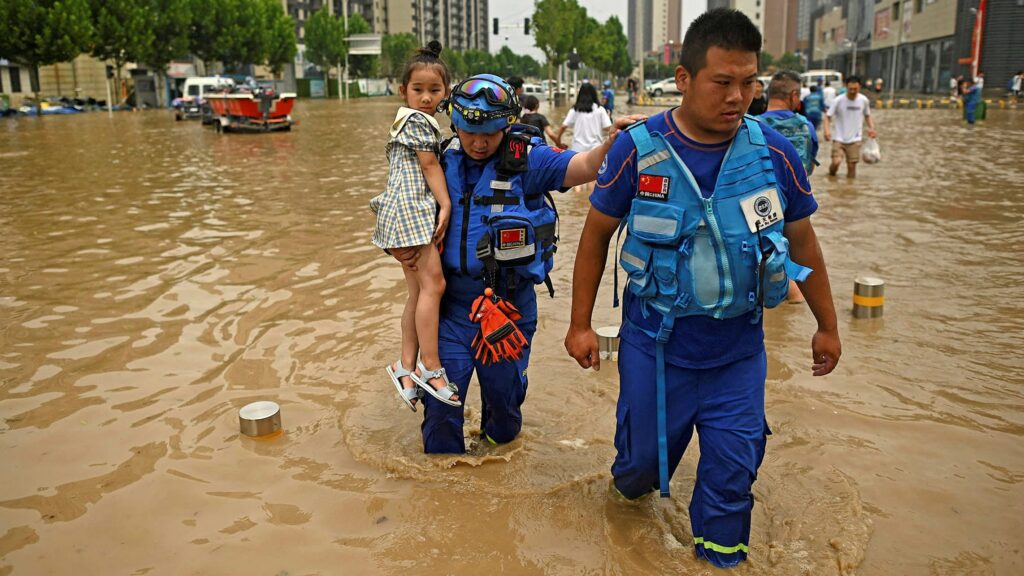Climate change is a common enemy the US and China must fight together


Climate change updates
Sign up to myFT Daily Digest to be the first to know about Climate change news.
The writer is chief executive of the European Climate Foundation
Imagine a future in which the world’s greatest powers were humbled by climate change. One where fires ripped into major cities, floods drowned people in their homes or on their way to work, heat brought economies to a grinding halt and pollution choked children at school. Imagine a global climate so unpredictable that the military bases of the world’s superpowers were at risk from the sea, bringing operations to a standstill. Imagine a world where droughts wiped out development gains in a year, splintering societies and generating huge displacement of people.
Or don’t imagine. Just observe 2021. You don’t have to pick up a dystopian novel. We are living in a climate altered by humans that is starting to unleash hell across the planet. This is a moment for leaders to step up — especially those of the world’s two superpowers, the US and China — both ravaged by the effects of the climate crisis in the past year. In today’s realpolitik, the most pressing global crisis for Joe Biden and Xi Jinping should be the one that’s in line to wipe 10-23 per cent off global GDP and the impact on the wellbeing of their citizens. They lead countries on the climate frontline, yet are well set to benefit from green growth. It is in their self-interest to collaborate, yet a state of mutual distrust means they’re failing to confront an enemy overwhelming their defences.
“For the first time in human history, humanity has the capacity to extinguish itself in a finite period of time,” veteran US diplomat Henry Kissinger said earlier this year, speaking of Washington’s and Beijing’s strained relations. He was referring to the threat of conflict between the two superpowers — but he could (and perhaps should) have been speaking about the climate crisis that is rapidly unfolding.
The pollution from fossil fuels is responsible for 8 million deaths a year, causes billions of dollars of damage and wrecks our natural world. Together the US and China account for around 40 per cent of global emissions — but that’s just half of the story. Decisions taken in Washington DC, Beijing and Brussels drive the global economy and shift markets.
Both the US and China need to step up for the planet and fast. The UN’s latest assessment of climate pledges offers a searing indictment of all major governments. Secretary-general António Guterres did not hide his anger when addressing world leaders last week in New York, and this week promises more frank exchanges behind closed doors at UN headquarters. To echo his words, we need to rediscover the spirit of collaboration, co-operation and goodwill that were the hallmarks of the Paris agreement.
If China fails to move away from coal then global emission targets will be impossible to meet and impacts on China itself will be dire. China can’t cut global emissions enough on its own, but the rest of the world can’t cut global emissions enough without China. If the US does not deliver on its promises to poorer nations to provide financial support for their net-zero transitions, its credibility as an international leader will be diminished. As former US climate envoy Todd Stern argued in 2020, it is in the economic self-interest of both nations to signal a shift in ambition. Both countries backed the Paris agreement in 2015 because they recognised it laid the template for global development — that was true then and it’s true today.
It is also true that signals do not currently look good. China’s foreign minister Wang Yi claims climate is a casualty of the damaged relationship caused by the US. All must be repaired or there can be no deal, he says. Biden wants the world to take its word that the US can deliver on its climate targets — despite lacking a clear plan to decarbonise or any global offer to poorer nations. Leaders watching the fall of Kabul and reflecting on the massive inequality in global Covid vaccine distribution may now think twice before trusting White House assurances. Yet both countries would do well to look back in order to walk forward.
“There is no instance of a country having benefited from prolonged warfare,” wrote the Chinese general Sun Tzu over two thousand years ago. Those words apply now — at the start of an existential fight against a crisis that, without global co-operation, will defeat us all. Long-range missiles, aircraft carriers and submarines cannot — to my knowledge — guard against hurricanes, drought and sea level rise. Climate change is not a deal, a transaction between big powers; it is about everyone’s security.